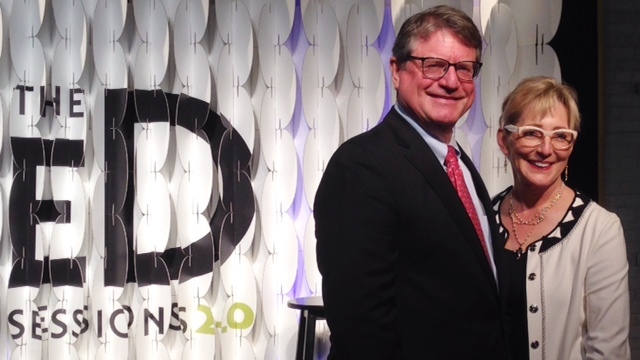In order to educate all kids, schools must understand students’ roots, their needs and their language, Ruby K. Payne said Tuesday.
Payne is an expert on the mindsets of three economic classes — poverty, middle class and wealth. She spoke Tuesday to a packed house at the Ed Sessions 2.0 monthly luncheon.

In her 45-minute talk, she said environment affects a child’s ability to learn and achieve. Educators must understand the differences of children raised in poverty vs. the middle class.
“The purpose of schooling is to change thinking,” she said. “If you work with people in poverty, some understanding of how different their world is from yours will be invaluable.”
Payne has written or co-authored a dozen books. Her most popular, “A Framework for Understanding Poverty,” has sold more than 1 million copies. The book is recommended for educators, employers and service providers. She has spoken about her findings in every state in America and 10 other countries.
On Tuesday, Payne shared examples of how people from different economic classes react differently to situations. For example, schools teach math by focusing on money management, a middle-class characteristic. People in poverty see money as something to use and spend, while wealthy people see money as something to conserve or invest.
People in the middle class, she said, “see their resource base as stable — you know where you’re going to sleep and what you’re going to eat. … If your resource base is unstable, it’s almost impossible to plan.”
Payne surveyed people around the country about how they spend their time. Here are some of the responses:
- Those in poverty — Entertainment, children, agency time, food and transportation.
- Those in middle class — Sports, hobbies, clubs, education, retirement and children’s activities.
- Those in wealth — Private clubs, charitable activities, travel and oversight of personnel concerns.
“None is better than the other, they’re just different,” Payne said. “Notice those in wealth don’t mention children because they have nannies and boarding schools.”
Different classes also have “hidden rules” and Payne shared several examples.
- Those in poverty — Share and borrow, because you, too, will soon be in survival mode.
- Those in middle class — Never quit a job until you have another and never tell people your salary.
- Those in wealth — Tradition and history are most important and acceptance is conditional on social standing and connections.
To build a better community and education system, Payne encouraged the audience to invite people from poverty to the table and learn from them.
“We have horrible policies because they are made by middle class,” she said. “It’s like a group of men making decisions for women.”
She also said it takes a great deal of time to create systemic change, maybe 25 years. The whole community must be involved and patience is critical.
“When someone tells me we have a three-year strategic plan, I tell them to give it up and just have a big party,” she said. “It can take 12 to 14 years before you see movement at all.”
Communities can’t just focus on educating kids. Parents need the capacity to create a thriving place to live where people can learn, improve and find work.
“People in poverty think the middle class is lucky and they have no concept of what went into that,” she said. “You might have to pay them to join in — we’ve given $25 gift certificates — but it will have a payoff in the end.”
To learn more about Ruby Payne, Ph.D., and her studies, go to Aha! Process, Inc., a Ruby Payne company. Click here see the video of any Ed Sessions lunches.
Disclaimer: The Ed Sessions 2.0 and Idaho Education News are funded by the J.A. and Kathryn Albertson Foundation.
